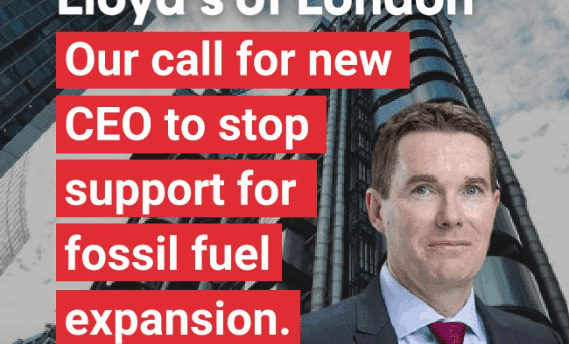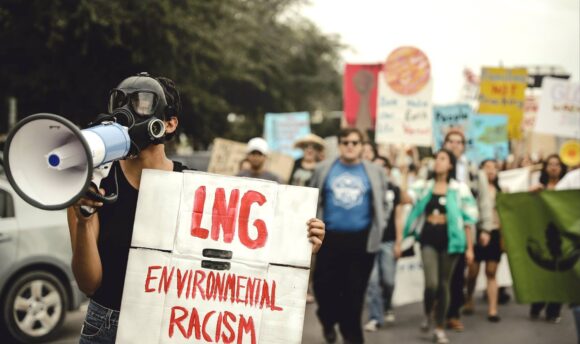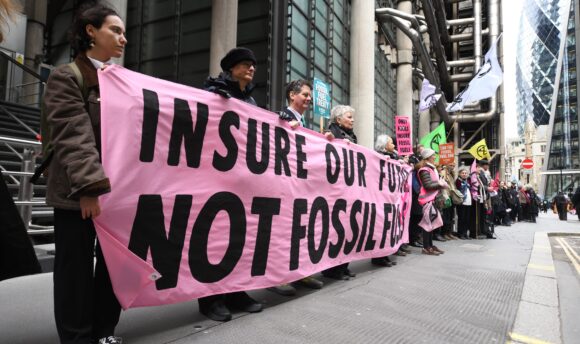Today, members of the Insure Our Future network and other social movements sent an open letter to insurers of energy network operator Gasunie, the company planning to build a liquified natural gas (LNG) terminal in Brunsbüttel, Northern Germany.
The letter was sent to Munich Re, AXA, HDI / Talanx, Zurich Insurance Group, AIG Europe, SCOR, Allianz, Chubb and Liberty Mutual, calling on them not to underwrite the proposed Brunsbüttel LNG terminal because it, and any other new or expanding fossil fuel projects, will lock the world into decades of additional greenhouse gas emissions, further fuelling the climate crisis.
To prevent catastrophic warming, fossil fuels should be phased out in line with a 1.5°C scenario. In the 2018 Special Report on Global Warming from the Intergovernmental Panel on Climate Change (IPCC), model pathways with no or limited overshoot of 1.5°C of general warming effect, required emissions reductions of between 40% and 60% by 2030 compared with 2010 levels. Limiting warming to 1.5°C means a nearly 8% reduction in emissions each year until 2030. This year the IPCC issued a ‘code red for humanity’ in its sixth assessment, emphasising the global need to reduce emissions before it is too late. In May, the International Energy Agency (IEA) made clear that fossil fuel infrastructure and investment, including new oil and gas, must stop now to achieve a 1.5°C aligned scenario.
“If insurers take their commitments to the Paris Agreement seriously, and continue to claim they are leading the industry’s race to net-zero, they need to stop underwriting and investing in new oil and gas projects and phase out existing oil and gas insurance in line with a 1.5°C pathway.”
“The IPCC’s recent ‘code red for humanity’ could not be any clearer – it is madness to build new fossil fuel projects that will lock the world into decades of additional greenhouse gas emissions and further fuel climate breakdown. All insurers of Gasunie need to show they take climate science seriously and rule out insurance for the proposed Brunsbüttel LNG terminal. In particular, given that AXA has led the insurance industry's exit from coal, it's time for the French insurance giant to now lead on oil and gas."
“Zurich, Allianz, AXA and Munich Re remain four of the world’s top oil and gas insurers despite co-founding the Net Zero Insurance Alliance. These insurers need to urgently live up to their climate commitments and lead the insurance industry’s exit from all new oil and gas expansion. Ruling out support for yet another underused and contested LNG terminal like Brunsbüttel would be an important first step on the way out of oil and gas insurance.”
“As parents we are aware of our responsibility to do our best to protect our children's future. It is heartbreaking to see Corporations and governments ignoring all science and pushing ahead with new Fossil Fuel infrastructure. It is more than troubling to see Insurance companies underwriting and therefore supporting such endeavours. We fervently ask them to stay away from these backwards, destructive projects and to embrace the future in the form of renewable energy and a safe climate.”
The letter was sent by the Insure Our Future campaign, Campax, Deutsche Umwelthilfe, Fossil Free Berlin, Parents for Future Berlin, Reclaim Finance, and urgewald.
Notes:
- In the March 2021 report Taking the Next Step, urgewald found that most European and US insurers were underwriting new LNG projects, including members of NZIA, particularly Allianz, AXA and Munich Re.
- While often being advertised as a “cleaner” bridge fuel by policy makers and fossil fuel companies, LNG has a very harmful impact on the climate. LNG is almost entirely made up of methane, which has at least 86 times more of a warming effect as a greenhouse gas than CO2 over a 20 year period. Brunsbüttel will cost €450 million to build, of which up to €100 million will come from German taxpayers. LNG terminals, like other fossil fuel infrastructure, require decades-long lifespans to pay off the initial costs of building them, thus locking us into another generation of fossil fuel use. The EU power sector needs to be fully decarbonised by 2035 which is in complete contradiction with building an LNG terminal intended to last at least 40 years.
- In May 2021 the International Energy Agency (IEA) concluded that “there is no need for investment in new fossil fuel supply” in a net-zero pathway to 2050 and that “beyond projects already committed as of 2021, there are no new oil and gas fields approved for development in our pathway, and no new coal mines or mine extensions are required.” Following this crucial stance, the IEA World Energy Outlook report will be released on 13th October.
- Climate activists are increasingly focusing on new oil and gas infrastructure. On July 30th, Ende Gelände and the Shale Must Fall campaign occupied the area that has been earmarked for the Brunsbüttel LNG terminal planned in the North of Germany. Thousands marched through the Schleswig-Holstein town to block the access road of the planned project site. Others traveled in canoes up the Kiel Canal to block ships.



